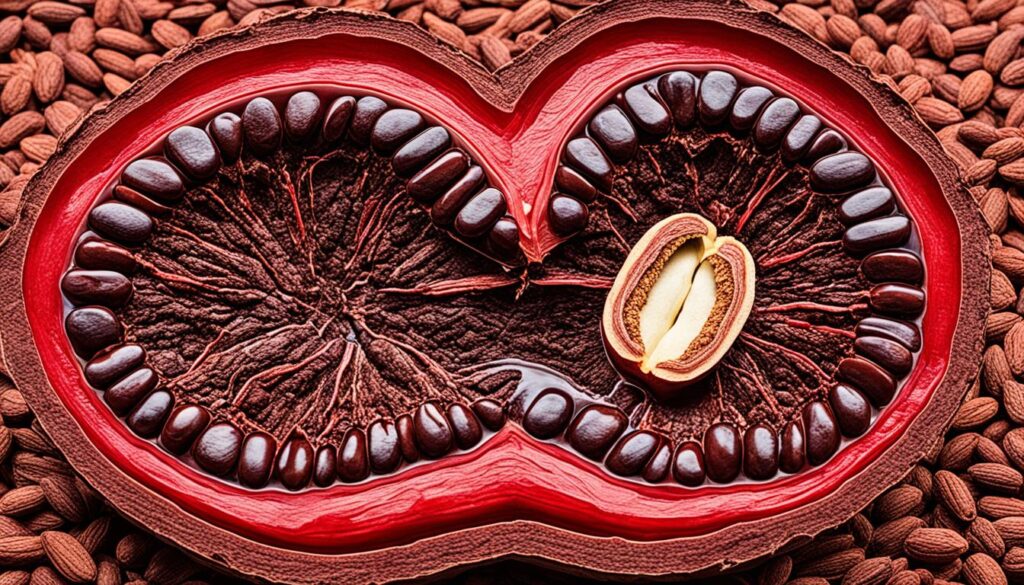Numerous studies have shown that consuming cocoa can improve blood flow and have positive effects on cardiovascular health. The flavanols present in cocoa have been found to increase the production of nitric oxide, which helps dilate blood vessels and improve circulation throughout the body. Improved blood flow can lower blood pressure, reduce inflammation, and support overall heart health. The antioxidant properties of cocoa also play a role in protecting the cardiovascular system from damage. By understanding the mechanisms by which cocoa can enhance blood flow, individuals can make informed decisions about incorporating this delicious ingredient into a heart-healthy diet.
Key Takeaways
- Consuming cocoa can improve blood flow and have positive effects on cardiovascular health.
- Flavanols in cocoa increase the production of nitric oxide, which helps dilate blood vessels and improve circulation.
- Improved blood flow from cocoa can lower blood pressure, reduce inflammation, and support overall heart health.
- Cocoa’s antioxidant properties also protect the cardiovascular system from damage.
- Understanding the mechanisms of how cocoa enhances blood flow can help individuals make informed dietary choices.
Understanding the Benefits of Cocoa
Cocoa is renowned for its rich, complex flavor, but it also offers a wealth of health benefits. Cocoa is an excellent source of antioxidants, particularly flavanols, which are a type of polyphenol. These antioxidants help protect the body’s cells from damage caused by free radicals, reducing the risk of chronic diseases.
Cocoa: A Rich Source of Antioxidants
The antioxidant properties of cocoa are primarily attributed to the presence of flavanols, a group of polyphenolic compounds that have been extensively studied for their beneficial effects on health. These antioxidants in cocoa play a crucial role in neutralizing harmful free radicals, which can contribute to the development of various chronic conditions, such as cardiovascular disease, cancer, and neurodegenerative disorders.
Exploring the Flavanol Content in Cocoa
Cocoa is one of the richest dietary sources of flavanols, a type of antioxidant that has been linked to numerous health benefits of cocoa. The flavanol content in cocoa can vary depending on the processing method and the specific cocoa variety. Generally, minimally processed cocoa and dark chocolate tend to have higher flavanol concentrations, making them particularly beneficial for why is cocoa good for you.
| Cocoa Product | Flavanol Content | Antioxidant Capacity |
|---|---|---|
| Raw, Unprocessed Cocoa Beans | High | Extremely High |
| Dark Chocolate (70-85% Cocoa) | Moderately High | Very High |
| Milk Chocolate | Low | Moderate |
| Highly Processed Cocoa Powder | Low | Low |
Does Cocoa Consumption Improve Blood Flow?

Numerous scientific studies have demonstrated that consuming cocoa can indeed improve blood flow and have positive effects on vascular health. The flavanols present in cocoa, particularly epicatechin, have been found to stimulate the production of nitric oxide, a crucial molecule that helps dilate blood vessels. This dilation of blood vessels leads to enhanced blood flow throughout the body, which can have numerous cardiovascular benefits.
The effects of cocoa on circulation have been extensively researched, with studies showing that regular consumption of cocoa can improve how does cocoa affect vascular health. The flavanols in cocoa are believed to enhance the body’s ability to produce nitric oxide, a signaling molecule that plays a vital role in regulating blood vessel function and promoting vasodilation.
By stimulating the production of nitric oxide, the does cocoa improve blood flow in a variety of ways. This can lead to a reduction in blood pressure, improved oxygen delivery to tissues, and an overall enhancement of cardiovascular health. The antioxidant properties of cocoa also contribute to these beneficial effects, helping to protect the vascular system from oxidative stress and inflammation.
Incorporating cocoa into a balanced and healthy diet can be a simple and delicious way to support the effects of cocoa on circulation and overall vascular health. Whether enjoying a square of dark chocolate or incorporating cocoa powder into your favorite recipes, the flavanols in cocoa can play a valuable role in maintaining how does cocoa affect vascular health.
Cocoa’s Impact on Cardiovascular Health

Cocoa’s positive impact on cardiovascular health is primarily attributed to its ability to increase the production of nitric oxide, a signaling molecule that plays a crucial role in regulating blood flow. This enhancement of nitric oxide production helps dilate blood vessels, improving circulation throughout the body and supporting overall vascular health.
Nitric Oxide Production and Vasodilation
The flavanols present in cocoa, particularly epicatechin, have been found to stimulate the production of nitric oxide, which in turn triggers the relaxation and expansion of blood vessels, a process known as vasodilation. This improved vasodilation leads to enhanced blood flow, reduced blood pressure, and better oxygen delivery to the body’s tissues.
Reducing Inflammation and Oxidative Stress
In addition to its effects on nitric oxide production, cocoa also demonstrates anti-inflammatory and antioxidant properties that contribute to its cardiovascular benefits. The flavanols in cocoa have been shown to reduce inflammation and oxidative stress, two key factors that can damage the cardiovascular system and increase the risk of heart disease.
By mitigating inflammation and oxidative stress, cocoa consumption can help protect the heart and blood vessels, reducing the risk of atherosclerosis, endothelial dysfunction, and other cardiovascular complications. This multifaceted approach to cardiovascular health makes cocoa a valuable addition to a heart-healthy diet.
Dietary Sources of Cocoa

Cocoa can be obtained from a variety of dietary sources, allowing individuals to incorporate this beneficial ingredient into their daily lives. From rich, indulgent dark chocolate to the versatile cocoa powder, there are numerous ways to enjoy the cardiovascular-supportive properties of cocoa.
Dark Chocolate: A Delicious Option
One of the most popular and convenient sources of dietary cocoa is dark chocolate. Dark chocolate is made by blending cocoa solids, cocoa butter, and minimal amounts of sugar, resulting in a deep, complex flavor profile. The higher the cocoa content in dark chocolate, the more flavanols and antioxidants it contains, making it an excellent choice for those seeking to improve their cardiovascular health through cocoa consumption.
Cocoa Powder: A Versatile Ingredient
For those looking to incorporate more cocoa into their diet, cocoa powder is a highly versatile ingredient. Unsweetened cocoa powder can be added to a variety of foods and beverages, from smoothies and baked goods to hot chocolate and even savory dishes. By incorporating cocoa powder into their daily routine, individuals can easily boost their intake of the beneficial compounds found in cocoa and support their overall cardiovascular well-being.
Optimizing Cocoa Consumption for Cardiovascular Benefits

To maximize the cardiovascular benefits of cocoa consumption, it’s crucial to consider the appropriate intake levels and the quality of the cocoa products consumed. The recommended cocoa intake for cardiovascular benefits can vary depending on individual factors, but research suggests that moderate consumption of high-quality cocoa can yield the most favorable results.
When it comes to tips for consuming cocoa for heart health, experts recommend opting for dark chocolate or unsweetened cocoa powder, as they tend to be higher in the beneficial flavanols. Avoid heavily processed or alkalized cocoa products, as they can have reduced flavanol content. Additionally, it’s best to consume cocoa as part of a balanced, heart-healthy diet, rather than relying on it as a sole source of cardiovascular support.
| Cocoa Product | Flavanol Content | Recommended Daily Intake |
|---|---|---|
| Dark Chocolate (70-85% Cocoa) | Highest | 1-2 ounces (30-60 grams) |
| Unsweetened Cocoa Powder | High | 1-2 tablespoons (5-10 grams) |
| Milk Chocolate | Moderate | Not Recommended |
By following these tips for consuming cocoa for heart health and adjusting your intake to the recommended levels, you can maximize the cardiovascular benefits of cocoa and support your overall heart health.
Cocoa and Blood Pressure Regulation

Numerous studies have demonstrated the positive relationship between cocoa consumption and blood pressure regulation. The key to this connection lies in the presence of specific flavanols, particularly epicatechin, which are abundant in cocoa.
The Role of Epicatechin in Blood Pressure Control
Epicatechin, a type of flavanol found in cocoa, has been identified as a crucial player in the regulation of blood pressure. This compound has the ability to stimulate the production of nitric oxide, a signaling molecule that helps dilate blood vessels and improve blood flow throughout the body. Studies have shown that the consumption of cocoa, rich in epicatechin, can lead to a reduction in both systolic and diastolic blood pressure, ultimately contributing to a healthier cardiovascular system.
The relationship between cocoa and hypertension has been further explored in numerous clinical trials and observational studies. For instance, the Flaviola Health Study demonstrated that the intake of cocoa flavanols, including epicatechin, improved endothelial function and reduced blood pressure among healthy participants. Similarly, the Zutphen Elderly Study revealed a positive association between cocoa intake and decreased blood pressure, leading to a lower risk of cardiovascular mortality in the elderly population studied.
The impact of epicatechin on blood pressure is particularly noteworthy, as this flavanol has been shown to enhance the production of nitric oxide, thereby promoting vasodilation and improving blood flow. This mechanism of action has been corroborated by multiple studies, including the work of Grassi et al., which found that flavanol-rich cocoa improved flow-mediated dilation and reduced arterial stiffness, ultimately leading to decreased blood pressure in healthy individuals.
Overall, the available evidence strongly suggests that cocoa consumption can have a positive effect on blood pressure regulation, with the flavanol epicatechin playing a central role in this process. By understanding the mechanisms behind this relationship, individuals can make informed decisions about incorporating cocoa-rich foods and beverages into their diet to support cardiovascular health.
Cocoa and Cholesterol Management

In addition to its positive effects on blood flow and blood pressure, cocoa consumption has also been linked to improvements in cholesterol management and overall lipid profiles. A growing body of research suggests that incorporating cocoa into one’s diet can have a favorable impact on the effects of cocoa on cholesterol levels and how cocoa can improve lipid profiles.
Improving Lipid Profiles with Cocoa
Studies have shown that the impact of cocoa on blood lipids can be quite significant, particularly for individuals with Type 2 diabetes. For example, a clinical trial published in the Diabetes Medicine journal found that consuming high-cocoa polyphenol-rich chocolate led to a boost in HDL (good) cholesterol levels in patients with Type 2 diabetes, ultimately improving their overall lipid profile.
Moreover, research has indicated that cocoa flavanol intake can have positive effects on endothelial function and the Framingham Risk Score, which are key indicators of cardiovascular health. By improving these markers, cocoa consumption may contribute to a reduction in the risk of heart disease and other related conditions.
The beneficial impact of cocoa on blood lipids is thought to be related to the presence of flavanols, a class of polyphenolic compounds found abundantly in cocoa. These antioxidant-rich compounds may help regulate cholesterol levels and improve overall lipid profiles, leading to enhanced cardiovascular health outcomes.
Individual Variations in Cocoa’s Effects

While the cardiovascular benefits of cocoa consumption are well-documented, it’s important to note that the magnitude of these effects can vary among individuals. The bioavailability and absorption of the active compounds in cocoa, particularly the flavanols, can be influenced by a range of factors, which can ultimately impact the degree to which an individual experiences the desired cardiovascular outcomes.
Factors Influencing Cocoa’s Bioavailability
The bioavailability of cocoa’s active compounds is influenced by various individual differences, such as individual differences in response to cocoa, factors that affect how the body absorbs cocoa, and variables that influence the cardiovascular benefits of cocoa. These factors can include genetics, age, gender, gut microbiome composition, and individual metabolism, all of which can contribute to the variability in how the body processes and utilizes the beneficial compounds found in cocoa.
For instance, some individuals may possess genetic variations that enhance their ability to absorb and utilize the flavanols in cocoa, leading to more pronounced improvements in blood flow and cardiovascular health. Similarly, the state of an individual’s gut microbiome can impact the transformation and bioavailability of these compounds, as the gut microbiota play a crucial role in the metabolism and utilization of cocoa’s active ingredients.
Additionally, factors such as age and gender can also influence the cardiovascular benefits of cocoa consumption. Older individuals or those with certain health conditions may experience different responses compared to younger, healthier individuals, due to physiological changes or pre-existing cardiovascular risk factors.
| Factor | Impact on Cocoa Bioavailability |
|---|---|
| Genetics | Genetic variations can affect an individual’s ability to absorb and utilize cocoa’s active compounds, leading to differences in cardiovascular responses. |
| Age | Older individuals may experience varied responses due to physiological changes and pre-existing cardiovascular conditions. |
| Gender | Hormonal differences between men and women can influence the absorption and utilization of cocoa’s active compounds. |
| Gut Microbiome | The composition of an individual’s gut microbiome can impact the transformation and bioavailability of cocoa’s active ingredients. |
| Metabolism | Individual differences in metabolism can affect the rate at which the body processes and utilizes the beneficial compounds in cocoa. |
By understanding these individual variations, healthcare professionals and researchers can better tailor cocoa consumption recommendations to suit the unique needs and characteristics of each individual, ultimately maximizing the cardiovascular benefits of this delicious and versatile ingredient.
Potential Side Effects and Precautions

While the cardiovascular benefits of cocoa consumption are well-documented, it’s important to consider the potential side effects and precautions to take when incorporating this ingredient into one’s diet. Excessive cocoa intake has been associated with some potential side effects of cocoa consumption, such as headaches, insomnia, and gastrointestinal discomfort, especially in individuals who are sensitive to the stimulant effects of cocoa’s natural caffeine content.
Furthermore, individuals with certain medical conditions, such as cardiovascular disease, diabetes, or allergies, should exercise caution and consult with their healthcare provider before consuming cocoa regularly, as it may interact with medications or affect the management of their condition. Pregnant and breastfeeding women, as well as children, should also be mindful of the safety of cocoa for cardiovascular health and consume it in moderation.
It’s important to note that the precautions to consider when consuming cocoa may vary based on individual factors, such as health status, dietary preferences, and sensitivity to cocoa’s active compounds. By being aware of these potential side effects of cocoa consumption and taking appropriate precautions, individuals can enjoy the cardiovascular benefits of cocoa while minimizing any adverse effects.
Conclusion
In conclusion, the available scientific evidence strongly supports the notion that consuming cocoa can have a positive impact on blood flow and cardiovascular health. The flavanols present in cocoa, particularly epicatechin, have been shown to stimulate the production of nitric oxide, a crucial molecule that helps dilate blood vessels and improve circulation throughout the body.
The importance of cocoa for heart health cannot be overstated, as numerous studies have highlighted its ability to lower blood pressure, enhance endothelial function, and improve lipid profiles, all of which are crucial factors in maintaining a healthy cardiovascular system. Additionally, the role of cocoa in a healthy lifestyle is becoming increasingly recognized, with research indicating that habitual chocolate consumption is associated with a lower risk of cardiovascular disease and heart failure.
By incorporating cocoa, particularly in the form of dark chocolate or cocoa powder, into a balanced and nutritious diet, individuals can take an active step towards supporting their heart health and overall well-being. The versatility of cocoa as a dietary source allows for easy integration into a variety of culinary applications, making it a convenient and delicious way to harness the cardiovascular benefits of this remarkable ingredient.

Leave a Reply